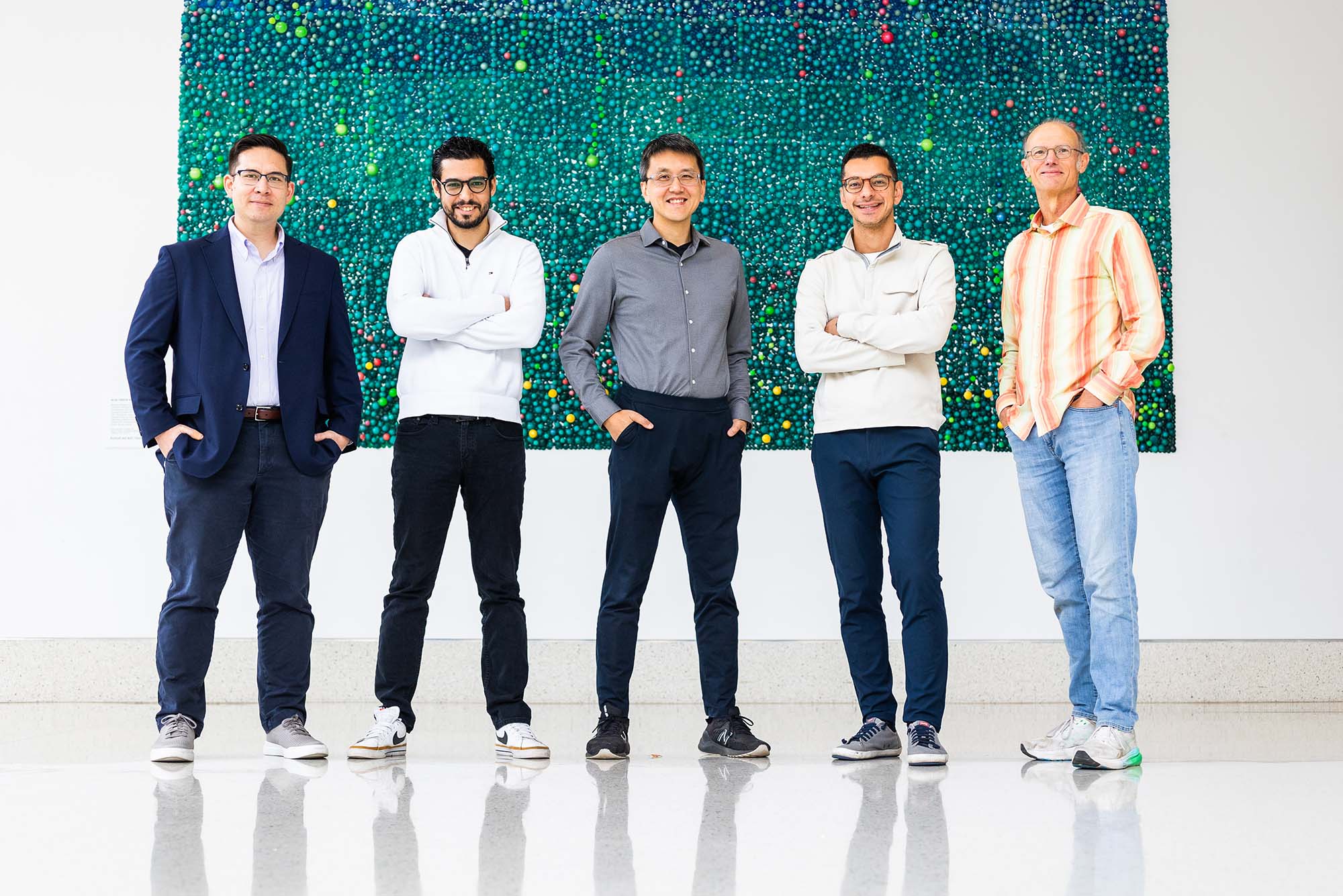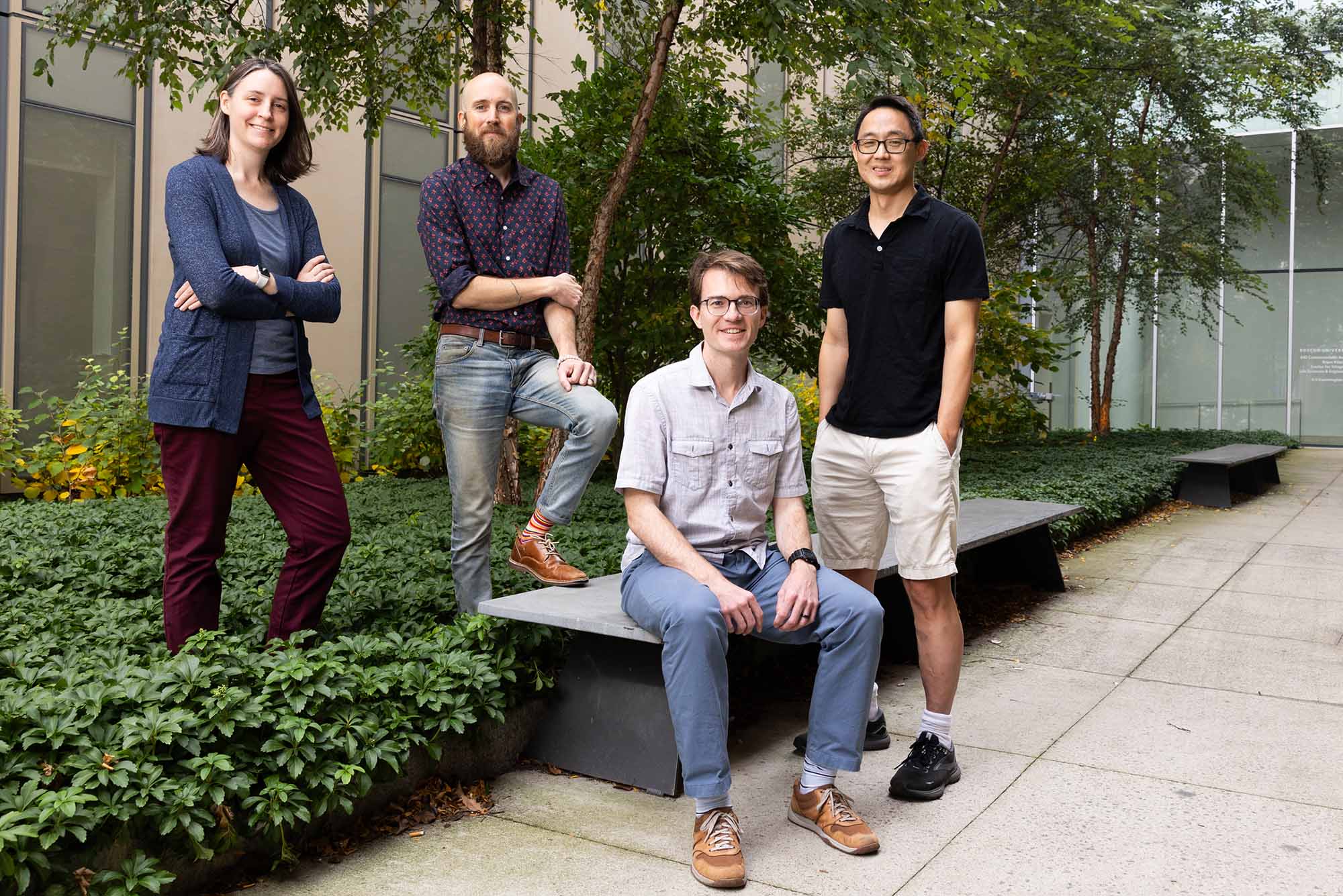News
Anne Curtis Receives 2025 NSF Graduate Research Fellowship Honorable Mention

Anne Curtis of the Chantranupong Lab received an honorable mention for the 2025 NSF Graduate Research Fellowship Program (GRFP).
Anne characterizes neuromelanin, a pigment lost in dopamine neurons during Parkinson’s Disease. Building off her stem cell experience at UC Santa Barbara, she is establishing the lab’s first induced pluripotent stem cell bank and optimizing the directed differentiation of midbrain organoids. She plans to track neuromelanin granule formation and function in her midbrain organoid model to better understand the role of this poorly studied pigment in dopaminergic neurons.
Congratulations, Anne!
Jennifer Bhatnagar Featured in The Brink

Dr. Jennifer Bhatnagar of Biology and MCBB, along with Dr. Pamela Templer of Biology and Dr. Lucy Hutyra of Earth & Environment, were recently featured in The Brink, which delivers the latest news about research and discoveries from faculties and students.
Led by Bhatnagar, their research focuses on the reasoning behind why city trees grow significantly faster than their rural counterparts. Their effort has won national recognition, and the W. M. Keck Foundation will provide them with $1 million to fund their research. The Keck Foundation's programs support outstanding science, engineering, and medical research, focusing on novel proposals that strive to break new ground.
The Brink spoke with Bhatnagar to learn more about the survival instincts of urban trees, the societal importance of preservation efforts, and why Keck’s recognition matters. Here's a look into their interview:
The Brink: What’s the goal of your project and how will you be conducting your study?
Bhatnagar: Recently, my colleagues, Lucy Hutyra and Pamela Templer, discovered that urban trees grow four times faster than rural trees, despite a multitude of environmental stressors in cities and the loss of typical belowground mechanisms for trees to acquire nutrients, tolerate stress, and gain protection from pathogens. The goal of our project is to understand exactly how it is that trees grow faster in cities. We will test the hypothesis that urban trees operate by a different “rule of life” than rural trees, shifting their survival strategies from belowground roots to aboveground canopies, taking advantage of aboveground atmospheric pollution as a source of nutrients, water, and stress protection to support faster tree growth...
Read more about their research and Bhatnagar's interview with The Brink here.
Muhammad Zaman Featured in The Brink
Dr. Muhammad Zaman, a BU College of Engineering professor of biomedical engineering who studies antimicrobial resistance and refugee and migrant health, was recently featured in The Brink.
In "Microplastics Could Be Fueling Antibiotic Resistance, BU Study Finds," a team of Boston University researchers led by Zaman found that bacteria exposed to microplastics became resistant to multiple types of antibiotics commonly used to treat infections. They say this is especially concerning for people in high-density, impoverished areas like refugee settlements, where discarded plastic piles up and bacterial infections spread easily.
“We’re demonstrating that the presence of plastics is doing a whole lot more than just providing a surface for the bacteria to stick—they are leading to the development of resistant organisms,” Zaman says. He directs BU’s Center on Forced Displacement, which has a mission to improve the lives of displaced people around the world. Past research has found that refugees, asylum seekers, and forcibly displaced populations are at an increased risk of contracting drug-resistant infections, due to living in overcrowded camps and having heightened barriers to receiving healthcare.
Read more about the study here.
Lynne Chantranupong Receives 2025 Sloan Research Fellowship

Dr. Lynne Chantranupong recently received the 2025 Sloan Research Fellowship. The Alfred P. Sloan Foundation recognizes standout young scientists whose work is promising and innovative. The winners each receive $75,000 over two years.
When Dr. Chantranupong joined the BU's faculty in January 2024, she launched multiple research projects to investigate cellular mechanisms in the brain. One of her focuses is elucidating how a specialized part of the cell, called the lysosome, gets rid of waste, and how this waste differs across neurons.
She recently started collaborating with Dr. Ji-Xin Cheng to image the contents of a single lysosome at higher resolutions. The Sloan Foundation award will support their collaboration and bolster Dr. Chantranupong’s ongoing research projects.
Read the full announcement here.
Congratulations, Dr. Chantranupong!
Five MCBB Faculty Receive 2024 Rajen Kilachand Fund for Integrated Life Sciences & Engineering Awards
Five MCBB Faculty are part of three groups to win 2024 Rajen Kilachand Fund for Integrated Life Sciences & Engineering Awards. The Fund, launched in 2017, has awarded $14 million to support projects that have advanced science, built collaborative structures for interdisciplinary research, and expanded funding opportunities. Learn about their projects below.

Dr. Wilson Wong and Dr. Florian Douam (BU School of Medicine), along with Dr. Alexander Green, Dr. Mark Grinstaff (BU College of Engineering), and Dr. Ahmad Khalil hope to to pioneer a new tool for fighting future pandemics.
About a year ago, Dr. Wong and Dr. Grinstaff discovered a novel way to modify saRNA, a breakthrough they’ve since used to create a more effective COVID-19 vaccine in collaboration with Dr. Douam. Combining this breakthrough with Dr. Khalil’s nanobody discovery platform and computational tools designed by Dr. Green, the team aims to create scalable, cost-effective, and rapidly deployable solutions for viral prevention and treatment.
Dr. Wong is leading the project with Dr. Douam; Dr. Green, Dr. Grinstaff, and Dr. Khalil are coinvestigators.

Dr. Joe Larkin and Dr. Mary Dunlop, along with Dr. Douglas Holmes and Dr. Harold Park, are leading innovative efforts to address the urgent global challenge of antibiotic resistance. Antibiotic resistance poses a serious global health threat, with bacteria evolving faster than new drugs can be developed.
The team's project focuses on horizontal gene transfer and the single-cell level events that are involved in making an individual bacterium transition from being drug-susceptible to drug-resistant. Using optogenetics, they aim to trigger and observe this process in real time, offering novel insights into how bacteria transition from drug-susceptible to drug-resistant. Their innovative work could lead to groundbreaking strategies to combat the spread of antibiotic resistance.
Read the full announcement here.
Congratulations, everyone!
Dr. Amanda Pinheiro Published in the Journal Development
 Dr. Amanda Pinheiro, an MCBB PhD alum of the Naya Lab, recently published a paper in the journal Development.
Dr. Amanda Pinheiro, an MCBB PhD alum of the Naya Lab, recently published a paper in the journal Development.
Dr. Pinheiro's paper was selected to appear as a “Research Highlight”, and both she and Dr. Naya were interviewed by the journal in “The people behind the papers” to discuss the significance of their work. This research article, “The Dlk1-Dio3 noncoding RNA cluster coordinately regulates mitochondrial respiration and chromatin structure to establish proper cell state for muscle differentiation”, demonstrates that these RNAs work together to regulate metabolism and epigenetics in muscle. You can read the paper here.
Congratulations Mandy!
Dr. Alexander Green Receives 2024 National Institutes of Health Director’s Transformative Research Award

Dr. Alexander Green, an Associate Professor for Biomedical Engineering in the Green Lab, received the 2024 National Institutes of Health Director’s Transformative Research Award.
The Transformative Research Award focuses on significance and innovativeness where the proposed project must address a significant problem and be bold, highly innovative, and transformative. The proposal must be high-risk, high-reward, and would not be funded through a conventional NIH funding mechanism. Lastly, the application will be anonymized to be reviewed by the NIH staff.
In Green's research, he hopes that by tracking the forces involved when cells interact with one another, like in cell-based cancer therapies, he can better control their behavior and pave the way for more potent disease treatments. It’s an out-there, novel idea—and it could fizzle or it could change lives. But Green’s chances of success have just been given a major boost.
Green is sharing the award’s $7.2 million funding with two researchers from Yale University, Julien Berro, and Xiaolei Su, and he says their proposed cell forces project would typically be a tough one to win backing for—all promise with, so far, little proof that it’ll work.
Green is just the third BU researcher to be given the honor, behind Bela Suki, an ENG professor of biomedical engineering, and Steve Ramirez (CAS’10), a College of Arts & Sciences associate professor of psychological and brain sciences.
Read more here.
Congratulations Dr. Alexander Green!
Dr. Brian Cleary Receives Career Development Professorship

Excerpt from The Brink "Career Development Professorships Awarded to Five BU Researchers"
They’re scholars of Latin American literature and Asian history, experts in biomedical engineering and computing, organic chemistry, and biology—and now, five rising star Boston University faculty are also winners of prestigious Career Development Professorships. The high-caliber awards, given annually by BU’s Office of the Provost, recognizes “talented junior educators emerging as future leaders within their respective fields.”
The professorships provide stipends for the recipients’ salaries and research for the next three years. The awards are named in honor of the donors and alumni who fund them, with winners nominated by their respective deans and selected by the provost’s office.
“Our current cohort of Career Development Professors are incredibly impressive both in terms of the breadth of their work and the impact they have already had on their fields. They bring energy, exciting new ideas, and fresh approaches to their research and teaching,” says Gloria Waters, University provost and chief academic officer. “We are grateful to our generous donors and alumni for their support and shared belief in the promise these rising colleagues present.”
This year’s Career Development Professors are:
Shibulal Family Career Development Professorship, established by BU Trustee S. D. Shibulal (MET’88)
Brian Cleary, a Faculty of Computing & Data Sciences assistant professor, who holds appointments in biology and biomedical engineering, investigates the nature of molecular, cellular, and tissue processes by integrating computational and algorithmic tools into biology research. Called “a deep thinker and fearless leader-in-the-making,” by his nominator, Azer Bestavros, a William Fairfield Warren Distinguished Professor of Computer Science and associate provost for BU’s Faculty of Computing & Data Sciences, Cleary “truly embraces the integrative, cross-cutting culture of CDS and embodies the qualities needed to be a leading innovator in data science.”
Read more here.
Congratulations Dr. Brian Cleary!
Dr. Mary Dunlop Receives New BU Postdoctoral Awards Excellence in Mentorship and Research

Excerpt from The Brink "New BU Postdoctoral Awards Celebrate Excellence in Mentorship and Research"
When postdoctoral researcher Jean-Baptiste Lugagne began applying to faculty positions last year, he steeled himself for a daunting process. In an intensely competitive job market, university search committees seek candidates who can demonstrate vast skill sets beyond their field-specific expertise, from teaching to grant writing to lab management.
But Lugagne had a secret weapon to help him through the job search: his faculty mentor, Mary Dunlop. A Boston University College of Engineering associate professor of biomedical engineering, Dunlop guided Lugagne in refining his research proposal, gave him feedback on his interview materials, and even helped him organize a practice “chalk talk” with other faculty to ensure he was prepared for his presentations to search committees. The preparation paid off: Lugagne is joining the University of Oxford as an assistant professor of engineering science next year.
Now, in recognition of her deep commitment to the professional and personal development of postdoctoral researchers at BU, Dunlop has been awarded the University’s first-ever Award for Excellence in Mentoring Postdocs. She was honored at BU’s National Postdoc Appreciation celebration.
“These awards reflect the critical contributions of our postdocs and their mentors,” says Pallavi Eswara, director of postdoctoral affairs at BU. “Our postdocs are doing excellent research, but they are also contributing to our research community in countless other ways, as teachers, mentors, DEI leaders, and innovators.”
Read more here.
Congratulations Dr. Mary Dunlop!
Megan Hopton Receives the Synthetic Biology & Biotechnology Fellowship

Megan Hopton of the Hao Lab, recently received the Synthetic Biology & Biotechnology (SB2) Fellowship.
SB2's mission is to foster the next generation of researchers capable of rigorously and creatively applying synthetic biology principles and approaches to a broad range of scientific problems. In addition to building a field-defining synthetic biology curriculum that includes technical training, mastery of computational and data analysis methods, and critical thinking skills, SB2 provides robust training in the professional development skills required for success in this highly interdisciplinary field, as well as unique exposure into the biotechnology sector that is already being transformed by this field.
In Megan's research, she is developing nanosensors that respond to the activity of endogenous proteases by emitting bioorthogonal "synthetic biomarkers". She aims to leverage this highly multiplexable technology to create low-cost, noninvasive, point-of-care diagnostics that can be used to detect cancer or differentiate between disease etiologies. She is also interested in establishing a high-throughput approach to assess protease activity in a spatial context in order to better inform the development of protease-activatable diagnostics and therapeutics.
Congratulations Megan!
